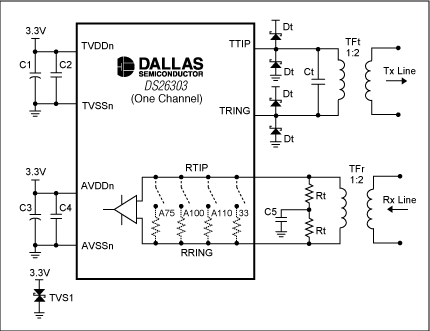
摘要:本文比较了DS26303和LXT384的不同,特别是提供了如何在已有的LXT384应用中使用DS26303,详细阐述了特性区别、
寄存器和硬件设计时的考虑。
概述本文比较了DS26303和LXT384的不同,特别是提供了如何在已有的LXT384应用中使用DS26303。DS26303是一个单3.3V供电的8通道E1/T1/J1短程线路
接口单元(LIU)。不需要更改
软件它就可以支持LXT384的功能,并且通过扩展的寄存器组它还能提供附加的特性。不需要改变
PCB,DS26303就可以用在现有的LXT384应用中,仅仅需要根据应用改变外围
元器件值。
特性的区别分为三个不同部分:表1为DS26303具备而LXT384不具备的一些特性;表2为LXT384具备而DS26303不具备的一些特性。表3为DS26303和LXT384共有但是在两个器件上实现不同的特性。
表6到表10为DS26303和LXT384寄存器之间的不同以及DS26303扩展寄存器组提供的附加功能。图1和表11为在现有的LXT384应用中使用DS26303时需要对器件值所做的细微改变。
表1. DS26303不同于LXT384的特性
DS26303
LXT384
Programmable opTIons to clear interrupt status on write or read. Clear on read is default.
Not supported.
Individual channel control for jitter attenuator:
- Enable/disable
- FIFO depth
- FIFO limit trip
All channels have global control.
Internal software-selectable transmit and receive side terminaTIon for 100Ω T1 twisted-pair, 110Ω J1 twisted-pair, 120Ω E1 twisted–pair, and 75Ω E1 coaxial applicaTIons.
Not supported.
In HPS mode, the transmitter output and the internal impedance of the receiver can be turned off with only the OE pin.
Requires that both receivers use the same front-end terminaTIon.
Built-in BERT tester for diagnostics.
Not supported.
Individual channel control for:
- Short-circuit protection
- AIS enable on LOS
- RCLK inversion
- TCLK inversion
All channels have global control.
Individual channel-line violation detection.
Not supported.
Flexible MCLK
See Table 4 for available input frequencies.
Not supported.
Programmable TECLK output pin (1.544MHz or 2.048MHz)
Not supported.
Programmable CLKA output pin See Table 5 for available output frequencies.
Not supported.
Flexible interrupt pin
Not supported.
表2. LXT384不同于DS26303的特性
DS26303
LXT384
Uses single optimal value.
Capability to select the jitter attenuator bandwidth.
—
Analog JTAG
MLCK Pin Functionality
The DS26303 and LXT384 both require MCLK to for data with clock recovery as well as AIS detection. The MCLK pin of the LXT384 provides additional functionality not present in the DS26303.
LXT384 MCLK held high.
- The LXT384 operates as a simple data receiver. The clock-recovery circuit is disabled and RPOS/RNEG are internally connected to an EXOR that is fed to the RCLK pin for external clock recovery. The PLL recovery circuit is disabled in this mode.
LXT384 MCLK held low.
- RPOS/RNEG and RCLK go to a high-impedance state.
表3. DS26303和LXT384共有的特性区别
DS26303
LXT384
3.3V LIU power only, 5V not provided.
5V LIU power.
Non-mux Intel® write address to WRB rising-edge setup time is 17ns.
Non-mux Intel write address to WRB rising-edge setup time is 6ns.
Expects non-mux Intel read address to be valid when RDB is active.
Non-mux Intel read address to RDB rising-edge setup time is 6ns. This might be an error in datasheet because data is out before this setup time.
Inactive RDY to tri-state delay time 12ns (max).
Inactive RDY to tri-state delay time 3ns (max).
Clears the interrupt pin when reading or writing the interrupt status.
Clears interrupt pin when reading the status register.
Jitter attenuator FIFO depths of 32 bits or 128 bits.
Jitter attenuator FIFO depths of 32 bits or 64 bits.
Individual channel control for jitter attenuator:
- Enable/disable
- FIFO depth
- FIFO limit trip
All channels have global control.
表4. DS26303 MCLK的选择范围
PLLE
MPS1, MPS0
MCLK MHz (±50ppm)
FREQS
T1 or E1 Mode
0
xx
1.544
x
T1
0
xx
2.048
x
E1
1
00
1.544
1
T1/J1 or E1
1
01
3.088
1
T1/J1 or E1
1
10
6.176
1
T1/J1 or E1
1
11
12.352
1
T1/J1 or E1
1
00
2.048
0
T1/J1 or E1
1
01
4.096
0
T1/J1 or E1
1
10
8.192
0
T1/J1 or E1
1
11
16.384
0
T1/J1 or E1
表5. DS26303
时钟A的选择范围
CLKA3 to CLKA0
MCLK (Hz)
0000
2.048M
0001
4.096M
0010
8.192M
0011
16.384M
0100
1.544M
0101
3.088M
0110
6.176M
0111
12.352M
1000
1.536M
1001
3.072M
1010
6.144M
1011
12.288M
1100
32k
1101
64k
1110
128k
1111
256k
寄存器的考虑事项DS26303包括四个主要的寄存器组。
- 主寄存器组(DS26303和LXT384)
- 二级寄存器组(DS26303独有)
- 独立LIU寄存器组(DS26303独有)
- BERT寄存器组(DS26303独有)
除了一个外,DS26303的主寄存器和LXT384中的寄存器是一样的。LXT384中地址为1Fh的保留寄存器在DS26303中成为其附加寄存器组的地址指针(ADDP)。如果DS26303代替现有的LXT384,不需要修改应用软件。表6为DS26303和LXT384主寄存器组列表。
表6. DS26303和LXT384的主寄存器组
Address (Hex)
DS26303
LXT384
00–15
Primary Registers
Registers
16–1E
Reserved
Reserved
1F
ADDP (Address pointer for additional register banks). This register must be set to point to the desired register bank.
00h) Primary Bank
AAh) Secondary Bank
01h) Individual LIU Bank
02h) BERT Bank
Reserved
为了利用DS26303的附加特性和灵活性,必须在所有LXT384应用的源代码中添加程序。DS26303中的ADDP寄存器的地址是1F (十六进制),这个地址在LXT384中是保留的。ADDP被用作指针来访问不同的寄存器组。表7为DS26303寄存器组列表和访问不同的寄存器组时所需要的ADDP值。
表7. DS26303地址指针选择
ADDP7 to ADDP0 (Hex)
Bank Name
00
Primary Bank
AA
Secondary Bank
01
Individual LIU Bank
02
BERT Bank
表8为二级寄存器组包含的寄存器列表,表9为独立LIU寄存器组包含的寄存器列表,表10为BERT寄存器组包含的寄存器列表。
表8. DS26303的二级寄存器组
Address (Hex)
Register Name
00
Single-Rail Mode Select
01
Line-Code Selection
02
Not used
03
Receiver Power-Down Enable
04
Transmitter Power-Down Enable
05
Excessive Zero-Detect Enable
06
Code-Violation-Detect Enable Bar
07–1E
Not used
1F
Set to AAh for access to Secondary Register Bank
表9. DS26303的独立LIU寄存器组
Address (Hex)
Register Name
00
Individual JA Enable
01
Individual JA Position Select
02
Individual JA FIFO Depth Select
03
Individual JA FIFO Limit Trip
04
Individual Short-Circuit-Protection Disable
05
Individual AIS Select
06
Master Clock Select
07
Global-Management Register
08–0F
Reserved
10
Bit-Error-Rate Tester Control Register
12
Line-Violation Detect Status
13
Receive Clock Invert
14
Transmit Clock Invert
15
Clock-Control Register
16
RCLK Disable Upon LOS Register
1E
Global-Interrupt Status Control
1F
Set to 01h for access to Individual LIU Register Bank
表10. DS26303的BERT寄存器组
Address (Hex)
Register Name
00
BERT Control Register
01
Reserved
02
BERT Pattern Configuration 1
03
BERT Pattern Configuration 2
04
BERT Seed/Pattern 1
05
BERT Seed/Pattern 2
06
BERT Seed/Pattern 3
07
BERT Seed/Pattern 4
08
Transmit-Error Insertion Control
09–0A
Reserved
0C
BERT Status Register
0D
Reserved
0E
BERT Status Register Latched
10
BERT Status Register Interrupt Enable
11–13
Reserved
14
Receive Bit-Error Count Register 1
15
Receive Bit-Error Count Register 2
16
Receive Bit-Error Count Register 3
17
Receive Bit-Error Count Register 4
18
Receive Bit Count Register 1
19
Receive Bit Count Register 2
1A
Receive Bit Count Register 3
1B
Receive Bit Count Register 4
1C–1E
Reserved
1F
Set to 02h for access to BERT Register Bank
硬件考虑事项不用改变PCB就可以用DS26303替换现有应用中的LXT384。需要做的是根据目标应用改变外部器件值。图1为DS26303推荐的网络端接电路,表11为DS26303正确端接时需要的器件值。
发送器LXT384要求发送端
电阻串联接入TTIP和TRING输出,建议这些电阻应该为0Ω (T1 3.3V模式),11Ω (E1 75Ω同轴)或者11Ω (E1 120Ω双绞线)。DS26303不要求电阻,所以所有模式中的电阻都应该为0Ω。当禁止脉冲成形时,LXT384要求有一个DC隔离
电容。DS26303不要求DC隔离电容,因此,如果现有LXT384应用的
PCB电路中有电容可以用一个0Ω的电阻替换。
接收器在接收侧,LXT384要求端接
阻抗为12.4Ω (T1 3.3V模式),9.31Ω (E1 75Ω同轴)或者15Ω (E1 120Ω双绞线)。当使用外部阻抗模式时,DS26303的所有情况都要求用15Ω端接电阻;当使用DS26303的软件选取阻抗匹配模式,不需要任何电阻。LXT384要求使用1kΩ电阻同RTIP和RRING管脚串联。如果DS26303采用软件选取端接/阻抗匹配模式,这些1kΩ的电阻可以用0Ω电阻代替。

图1. LIU前端
电路图
表11. LIU前端值
Mode
Component
75 Coax
120 Twisted Pair
100/110 Twisted Pair
Tx Capacitance
Ct
560pF (typ). Adjust for board parasitics for optimal return loss.
Tx Protection
Dt
International Rectifier: 11DQ04 or 10BQ060 Motorola: MBR0540T1
Rx Transformer 1:2
TFr
Pulse: T1124 (0°C to +70°C)
Tx Transformer 1:2
TFt
Pulse: T1114 (-40°C to +85°C)
Tx Decoupling (ATVDD)
C1
Common decoupling for all eight channels is 68µF.
Tx Decoupling (ATVDD)
C2
Recommended decoupling per channel is 0.1µF.
Rx Decoupling (AVDDn)
C3
Common decoupling for all eight channels is 68µF.
Rx Decoupling (AVDDn)
C4
Common decoupling for all eight channels is 0.1µF.
Rx Termination
C5
When in external impedance mode, Rx capacitance for all eight channels is 0.1µF. Do not populate if using internal impedance mode.
Rx Termination
Rt
When in external impedance mode, the two resistors for all modes is 15.0Ω ±1%. Do not populate if using internal impedance mode.
Voltage Protection
TVS1
SGS-Thomson: SMLVT 3V3 (3.3V transient suppressor)



 微信扫一扫
微信扫一扫
 支付宝扫一扫
支付宝扫一扫
评论列表(0条)